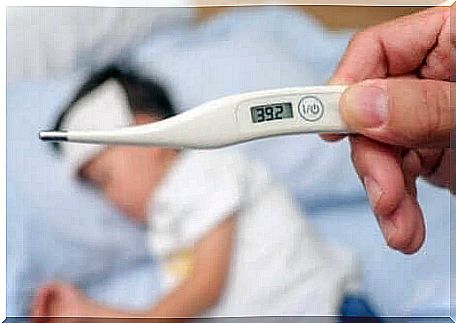The Relationship Between Body Temperature And Fever

Have you ever wondered why your body temperature rises when you have a fever? It is actually a natural defense mechanism, although it does cause some unpleasant symptoms. Learn more about it in this article!
Fever or pyrexia occurs when the body temperature rises above normal. It is a protective mechanism and most people experience fever at some point in their lives.
There are many reasons why one can go and get fever. Often it has to do with the presence of pathogens that the body perceives as foreign bodies.
This, of course, makes us wonder why body temperature rises when we have a fever. It may seem illogical at first, because all the symptoms associated with an abnormal increase in body temperature only make the discomfort caused by foreign microorganisms worse.
But fever has evolutionary benefits, just like any other human physiological response. In today’s article we will explain why it is necessary for our survival.
An increase in body temperature and fever
As a rule of thumb, any temperature above 37.0 C constitutes a fever. Still, one can talk about four types:
- A low fever is when the body temperature does not exceed 38.0 C.
- A moderate fever is when the temperature is between 38.0 and 39, o C.
- The body temperature during high fever is above 39.0 C.
- The latter is hyperpyrexia when the temperature is equal to or above 40.0 C.
Complications can quickly occur when a patient suffers from a state of hyperpyrexia. This is because it can lead to a number of changes in the proteins in the nervous system. Thus, you risk various organ failure, and a high risk of dying if you do not receive immediate medical treatment.

Temperatures above 39.0 C can be dangerous if not treated properly.
Why do we get a fever?
Fever is the body’s reaction to elements from the outside, which become harmful to us if it gets out of control. But why does the body raise its own temperature if it can be dangerous?
First of all, we must consider fever as an ancient defense mechanism. The hypothalamus, which is the part of the brain that is responsible for regulating body temperature, sends signals to raise it when it detects molecules called pyrogens in the blood.
A pyrogen is any fever-creating substance. These can be, for example, polysaccharides or residues from the cell walls of bacteria.
The immune system, which forms inflammation, reacts defensively to the presence of foreign bodies in a person’s body. In this way, fever is another element of the body’s self-defense.
The body’s system hopes that by raising the temperature it will kill the microorganisms that are most sensitive to change when exposed to higher heat. Most bacteria that cause infections thrive at 37.5 C.
As one’s body temperature increases, the microorganisms will stop multiplying. Or at least they make it less fast and efficient. In this way, their vulnerability to the immune system becomes greater. Fever is therefore an evolutionary mechanism with a clear purpose: to attenuate the pathogens.

Discomfort with fever is due to the symptoms that the high temperature creates in the body.
Is fever a superfluous or a beneficial mechanism
Fever helps fight disease, but it can also lead to death or cause irreparable damage in really serious cases. This then raises the question: Should doctors allow an increase in body temperature? And if so, to what extent?
This is a continuing debate in medical circles. Some professionals prefer to allow fever at a moderate level so that the immune system works better. Others are in favor of trying to reduce it with antipyretics. There is no single answer to this. However, everyone agrees that a patient with a fever above 39.0 C requires immediate treatment.
This is why over-the-counter medications with acetylsalicylic acid or paracetamol are available that can lower body temperature. Now that modern medicine has given us antibiotics and antiviral drugs, it is no longer necessary to undergo drastic rises in temperature to fight diseases.
High body temperature is a good reason to consult a doctor
Fever is just one of several defense mechanisms that the body initiates to remove possible pathogens. It not only kills the microorganisms that are most sensitive to changes in temperature, it also weakens the most resistant ones.
For parents, an increase in their children’s body temperature is often something to worry about. However, they must learn the difference between an incipient low-grade fever, which may not exceed 38.0 C, and a fever of 39.0 C or higher.
In all cases, fever is always a good reason to talk to your doctor. So call or visit your doctor if you notice an increase in your body temperature so the doctor can make a quick diagnosis and suggest the right treatment.









